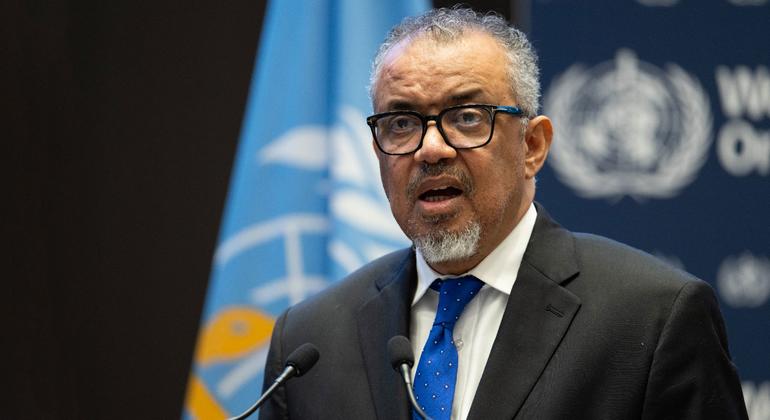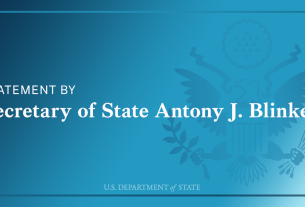President Trump’s executive order of 20 January is regrettable “and we hope the US will reconsider,” said WHO Director-General Tedros Adhanom Ghebreyesus, in a speech to the organization’s executive board.
The WHO chief said he would welcome the opportunity “to preserve and strengthen the historic relationship between WHO and the US.”
Pushing back on the rationale laid out in the executive order, Tedros said WHO had implemented the deepest and most wide-ranging reforms in its history over the past seven years.
The US is the biggest donor by far to the agency, accounting for around 14 per cent of its $6.9 billion budget, according to latest WHO figures.
Addressing the US complaint that it is paying too much compared to other countries, Tedros said reducing reliance on the US and others who pay the most was a “critical element of our long-term plan to broaden our donor base.”
COVID record
Third, he rejected the accusation that WHO had mishandled the COVID-19 pandemic:
“From the moment we picked up the first signals of ‘viral pneumonia’ in Wuhan, we asked for more information, activated our emergency incident management system, alerted the world, convened global experts, and published comprehensive guidance for countries on how to protect their populations and health systems – all before the first death from this new disease was reported in China on the 11th of January 2020.”
Tedros also addressed the allegation that WHO lacks independence from “inappropriate political influence” by some Member States: “WHO is impartial and exists to serve all countries and all people,” he said.
“Our Member States ask us for many things, and we always try to help as much as we can. But when what they ask is not supported by scientific evidence or is contrary to our mission to support global health, we say no, politely.”
A government-run shelter in the Philippines is a safe haven for girls who have been physically and sexually abused and exploited, including through the sex tourism industry. (file)
A third of women experience physical or sexual violence: Rights experts
Approximately one in three women is subjected to physical or sexual violence, and 800 women and girls continue to die every day from preventable causes during pregnancy and childbirth, a top independent rights panel meeting heard on Monday.
Addressing the Committee on the Elimination of Discrimination Against Women (CEDAW) at the UN in Geneva, Andrea Ori from the UN human rights office, OHCHR, said that the world is “still far” from achieving the goal of gender parity.
“The global landscape has changed,” she told the CEDAW session.
Backlash against equal rights
“We are witnessing a backlash against women’s human rights and gender equality, especially against women’s sexual and reproductive health rights – with an increase in attacks against abortion providers, shrinking civic space for women human rights defenders, and reduced funding.”
Mr. Ori noted that 2025 marks 30 years since the universal adoption of the Beijing Declaration and Platform for Action for ensuring women’s human rights and achieving gender equality around the world.
It remains the case, however, that sexual violence against women and girls continues to be used as a tactic of war in numerous conflicts, the UN human rights official said, while only 26 per cent of parliamentarians in the world are women and only around three in 10 women have managerial roles at work.
One less for the road: Time Europe cut down on booze intake, WHO warns
The UN World Health Organization (WHO) urged Nordic countries on Monday to keep a lid on alcohol sales, or risk reversing the positive impact of strict regulations put in place years ago.
For decades, governments in Finland, Iceland, Norway, Sweden and the Faroe Islands have restricted supermarkets and private retailers from selling stronger alcoholic beverages.
This policy has resulted in some of the lowest alcohol consumption levels in the European Union – which by contrast is the booziest region globally, with drinking habits “largely unchanged” for over 10 years, WHO said.
Free market pressures
The Nordic model is now at risk however, from legislative initiatives in the region that signal a potential shift toward privatization of alcohol sales, warned WHO’s Dr. Carina Ferreira-Borges.
In Sweden, for instance, a court is hearing a challenge to the Government’s exclusive rights to online sales of alcohol, while proposed laws would permit sales of alcoholic beverages in farm shops.
Dr Ferreira-Borges explained that Nordic countries’ alcohol controls – that involve increasing taxes and raising prices, limiting availability and restricting advertising – have reduced alcohol-related harms.
These span from “liver disease, cancers and cardiovascular conditions, to injuries and drownings”, she insisted.



